- Home
- Tom Savage
Precipice Page 18
Precipice Read online
Page 18
Potter had asked questions and listened politely as Kay answered them. She had noticed his interest as he watched her examine the personal belongings on his desk: clothes, shoes, bag. . . .
Oh, Sandra, she thought. You poor, unlovely, unloved young woman.
Then she thought about Diana Meissen. She told herself that what she was beginning to suspect was not possible. It was really too far out even to consider. . . .
She had passed the Land Rover, walked right by it toward the other end of the lot. She stopped, realizing, turned around, and retraced her steps.
Go home, Kay.
The young woman sat there, her eyes on the child who perched on the couch next to her, hearing but not listening to her breathless, girlish monologue. She was concentrating, rather, on those other noises that provided a constant soundtrack in the house on the cliff: the whistle of the trade wind through the glass doors facing the ocean, the odd cry of the gulls, and the rhythmic, muffled, faraway crashing of the breakers against the rocks below. The ever-changing but never-ending sounds of the island.
“. . . and they have another horse, a mare named Mrs. Ed—she’s Mr. Ed’s wife—and Mr. and Mrs. Ed have two children, Dancer and Starface. I always ride Starface; she’s the gentlest . . .”
Where was Kay? It was nearly dinnertime, and she had not yet returned from—wherever. Adam had returned from his sail a half hour ago: he was in the master apartment now, showering and dressing.
The living room was bathed in amber light from the golden sunset outside. Through the wall of glass she could see a vast expanse of bright, wheat-colored sky. The water in the distance appeared light brown, with a million yellow highlights.
“. . . a party on Labor Day with all their friends. We ride the horses and have a picnic near the golf course in Greenwich. I hope they’re planning that this year. Do you play golf, Diana? Aunt Trish does, and Daddy used to . . .”
It was this last random statement that brought her back from her woolgathering and focused her attention on Lisa. She watched the girl for a moment, and when Lisa at last paused to draw breath, she inserted a question.
“Do you think about your father a lot?” she asked.
“Oh, yes,” Lisa whispered. “Every day. He was wonderful. He always made me laugh—and Mommy, too.” She paused before adding, “What about you, Diana? You never mention your parents. Do you see them a lot?”
She felt the dry tightness at the back of her throat and the stinging at the corners of her eyes as she regarded the child’s innocent, upturned face. She doesn’t know, she thought. I’ve never told her. I’ve never mentioned it to any of them.
“No, Lisa,” she said quietly. “I lost both of my parents a long time ago.”
They sat facing each other in silence as the last golden sunlight slowly faded from the room. Then Lisa, in an act that contradicted her thirteen years and flashed forward to the graceful woman she would become, nodded once and reached out gently to take the young woman’s hand in her own.
The door under the staircase opened and Adam arrived in the living room. He was fresh from his shower, in a starched, short-sleeved white shirt and faded jeans. His platinum hair glistened in the dying light of day. Perhaps sensing the mood in the room, he went silently over to the opposite couch and sat.
She turned her attention from Lisa to Adam, aware—for the hundredth time—of the acute, overwhelming sensation she always experienced when this man came into her presence. It was a sharp, clear, naked emotion, so powerful that for a brief second, she wondered if Lisa could pick up on it. Oh, God. . . .
A moment later, the sound of the approaching Land Rover reached them. The three listened as the car was parked and Jumbi ran into the driveway from the garage to bark a greeting. Then they turned to watch as Kay and the dog came in to join them.
Kay looked around at them all, her gaze finally coming to rest on the young woman on the couch.
“Lisa,” she said in a quiet voice, not looking at her daughter as she spoke, “run upstairs and get ready for dinner.”
Without a word, the child obeyed. Jumbi followed her up the stairs. When they were gone, Kay dropped wearily down next to her husband.
Adam touched her arm. “What is it, Kay?”
She shook her head, still gazing over at the other woman. “Bad news, I’m afraid. I’ve just been down at the Fort with Chief Potter. Sandra’s disappeared. They think she’s drowned.”
There was silence in the room. Kay’s words traveled slowly across the table and crashed into the young woman’s consciousness. Drowned. Had she said drowned?
Kay resumed the story, explaining about the clothes and the bag on the beach and the Jeep parked among the trees. Sandra had been traced to a guest house downtown, where she’d been staying since her inexplicable departure from Cliffhanger, and the landlady there had not seen her for nearly a week. Potter had shown Kay the girl’s possessions: the clothes and the bag. . . .
The bag. At the mention of it, the young woman very nearly gasped aloud. The manila envelope with the money. Was there any way for the police to trace it to her?
Adam was watching her intently. She glanced up, startled by his intense gaze. She knew he was thinking what she had been thinking. Carefully, as unobtrusively as possible, she met his eyes and shook her head once. No, she communicated. If the silly girl had actually kept all that cash rather than putting it in a bank, there was nothing about the bills or the envelope that could possibly connect them, herself and Adam, to any of it. I was careful, her eyes told him. I did as you instructed. Large bills, from a bank in New York several weeks ago, and a plain, unmarked envelope.
She couldn’t breathe. There as a pressure in her chest, a tingling in her knees. She leaned back, the nails of her right hand clutching the arm of couch. Drowned. . . .
Impossible, she thought irrelevantly. People don’t drown; not really. Not so very conveniently. . . .
Why did Kay Prescott continue to watch her? What was it about the woman’s attitude? Natural curiosity at how Sandra’s successor was taking the news? Or was it suspicion? Had they found something? Did Kay know something? Had that silly girl written down her name and her phone number at Bolongo for possible future extortion?
Her purse. Oh, God: she’d left the table at Sparky’s for several minutes, gone to the ladies’ room. She hadn’t taken her purse. Had Sandra . . .?
She willed herself, forced herself, to look directly at Kay. She studied the woman’s face. I can’t read your expression, she thought. I don’t know what you’re thinking. . . .
“It was rather pathetic, really,” Kay said, turning her gaze at last from the young woman across the room to Adam, on the couch next to her. “There was just a blouse and a scarf and a pair of sandals. The bag was full of fan magazines. An empty wallet and some makeup and a pack of gum—and those damned, silly magazines. The poor thing.” She shook her head absently and reached over to take her husband’s hand.
On the other side of the coffee table, the hand that clutched the arm of the couch opened, relaxed. The young woman leaned back against the cool leather and raised her hand to her eyes, weak, powerless with relief. It washed over her in waves, one after another. Kay doesn’t know, she thought. It’s all right. It’s all right it’s all right it’s . . .
Holding his wife’s hand tightly in his own, Adam looked across the table and smiled.
Kay, noting the girl’s apparent distress, leaned forward. “What’s the matter, Diana? Are you feeling ill?”
The young woman regarded Kay for a moment before replying, and in that moment another facet of the plan was put in action.
“I suppose,” she sighed, smiling rather weakly. “A bit of a headache. I haven’t been sleeping well the past few days. I wonder, could you give me the name of your doctor?”
Margaret sat at her desk, staring down at the pictures.
It had been nearly six o’clock when they arrived back at the house from the stationery store in the next town, th
e nearest fax service of which Margaret was aware. She now possessed three eight-and-a-half-by-eleven sheets of paper displaying eight remarkably clear color reproductions of snapshots Robin Trask had taken in St. Thomas the day before. Robin had compiled quickly and efficiently from his end, and he hadn’t asked any questions. For that Margaret was grateful: she would fill him in later if necessary.
Dr. Stein had driven her in his Volvo. As he drove, he broke the news to her of his impending vacation. On Monday, he told her, he and his wife were flying to Europe for three weeks. Three weeks, she’d thought as they parked and entered the store. Too long. If his suspicions are correct, something will have to be done before he returns. And I will have to do it. Alone.
She wondered what his wife was like. Was she the sort of woman who would put off a long-awaited vacation for the sake of one of her husband’s patients? It hardly mattered: Margaret would never ask. She’d imposed on him quite enough. Besides, the girl was no longer his patient.
Now, examining the photographs with a magnifying glass, she wondered if there was really anything to worry about in the first place.
She’d spread the pictures out across the desk. On the left was the framed photograph of Karen Lawrence. In the center was the page from the dismantled scrapbook, the newspaper shot of Kimberly Brown with Mr. Phillips. To the right of this were the pictures from St. Thomas. Their eyes traveled from left to right. Twenty years ago. Ten years ago. Yesterday.
Margaret held the glass over the final series of photos. A cloudy day, rough water in the background; in the foreground, the crowded cockpit of a medium-size yacht. Happy, smiling people. The central image in all of the pictures was a lovely little red-headed girl grinning into the camera: the birthday girl. More children, flanking the star. Her niece, looking rather peculiar with dark-brown hair, smiling self-consciously into the lens, as if she’d really prefer not to have her pictures taken. A handsome young man pulling on a rope, or sheet, or whatever it was called. A young woman with him, what Margaret’s mother would have called an obvious blonde. A large, beefy, red-faced man of about fifty, probably Irish and certainly friendly, his arm around the tiny waist of an elegant, exotically beautiful, fiftyish former-model type. A rich woman, Margaret decided. Well-bred, globe-trotting femme du monde, definitely underweight. She wondered, briefly, who these people were.
But the face that she and the doctor were now scrutinizing so closely belonged to a tall, slender redhead in her forties who appeared in four of the photos. There was only one really clear shot; in the others the woman was either turned slightly away or hidden behind a large pair of sunglasses and a low-brimmed straw hat. In the single good picture of her, Kay Prescott stood next to her daughter in the cockpit, grinning into the camera. Behind them could be seen the back of someone’s head: a tall, platinum-haired man at the helm. Mr. Prescott, presumably. The woman had temporarily removed the hat and sunglasses, and she had her arm around the child’s shoulders. It was a perfect shot.
And that was the problem.
“No,” Margaret said at last, speaking for both of them.
“This is not the same woman.”
She hadn’t yet progressed to the next step, considered the implications of this simple, irrefutable fact. She only knew one thing, and it filled her with a sense of great relief. Karen Lawrence and Kimberly Brown and Kay Prescott were three different women. There was a resemblance—a strong one—between the first two. There was even a chance that, given ten years and a different hairstyle, they might be one and the same. But neither woman looked anything like the woman in St. Thomas.
“There goes that theory,” Dr. Stein said, grinning rather sheepishly as he went around the desk and sat across from her. He reached up and rubbed his eyes.
Margaret put down the magnifying glass and looked up at him. “What now?”
The doctor leaned back and emitted a long sigh. “Now I apologize for worrying you, and I go home to dinner. And now you relax and accept one other possibility, a possibility I should have considered. Maybe—just maybe—she’s not doing anything. Maybe she just likes the Caribbean, likes the idea of changing her environment and her physical appearance, likes living with a picture-perfect family”—he waved a hand at Robin’s photos—“in whatever capacity. I thought there must be a pattern, a method in all of this—some outrageous plan. And so did you. We were both perfectly willing to believe my theory of elaborate revenge against some shadowy—and, as it turns out, nonexistent—woman. Don’t you see? We were willing to believe that of her because that’s the impression she gives. I’ve studied her professionally, and you’ve known her since she was born. We both know she’s capable of it.
“But it’s obvious I was wrong,” he continued, and his voice changed again. Now he sounded certain of himself. “I think she’s simply trying to get her act together, if you’ll excuse the out-of-date lingo. A change of scene, a change of outlook. Maybe this is her way of putting her past behind her. She’ll be back, Margaret, and soon. You must know that. You are her only steadying influence. You always have been.”
He looked down at the pictures on the desk, then over at the little gold-framed photo that rested permanently on one corner of the blotter. In it she was wearing a cap and gown, staring sullenly out at the world, the lovely hair falling down around her shoulders. High school graduation. He shook his head, grinning ruefully down at the photograph.
“She really is an extraordinary young woman,” he said.
They sat in silence for a long time. Then, as Margaret watched him, the doctor rose to leave. He reached across the desk to shake her hand.
“I’ll call you when I get back from Europe,” he said.
She walked him to the front door. He was out of the house and heading toward his car when she finally stopped him with the question she’d been wanting to ask for the past several minutes.
“Dr. Stein,” she called from the doorway.
He turned around on the front walk.
“What would you have done,” she asked, “if your theory had been correct?”
A slow smile spread across his face.
“It’s not what I would have done,” he said. “What would you have done?”
Then, with a nod and a wave, he turned and walked into the early-evening shadows.
She closed the heavy front doors and leaned back against it, listening as the car started and drove away. She gazed ahead of her into the living room. It’s getting dark, she thought. Time to turn on the lights.
What would she have done? A very good question.
And she would have to figure out the answer, she realized, moving slowly toward the kitchen to see what Mrs. O’Rourke had left for her dinner, switching on every lamp she passed until the entire house was ablaze with light, belying the darkness that pressed in against the windows.
The doctor was mistaken. She was certain of it; she had never been more certain of anything. His initial theory, erroneous though it had turned out to be, was still closer to the actual truth, whatever that was. Her niece was up to something. Something dark and secret and wrong.
And she, Margaret, was on her own.
Nineteen thousand, four hundred, and seventy-six dollars! The old beachcomber couldn’t believe his luck. He counted it all again just to be sure. He glanced nervously up and down the beach, half expecting Chief Potter himself to drop out of the nearest sea-grape tree and clap him in irons. He reached inside the filthy, tattered jacket and pulled out the pint bottle of rum he’d swiped from the bar he’d been begging in last night. He unscrewed the cap and took a good, long pull.
No more begging, he thought. Not ever.
He sat down in the sand and smoothed out the bulging, wrinkled envelope on his knee. In the dying light of sunset, he worked his way once more through the lettering scrawled across the front.
This is not good, he thought. That last part is a name and address, probably of the money’s owner. If anyone finds this, they’ll take the money away. Even now, he knew
, the police could be looking for him. It wasn’t until after he’d placed the call to them that he’d looked in the envelope and seen its contents. He’d taken it and made his escape before they arrived.
His sister in Dominica. That was the answer! Tomorrow morning he’d make his way down to the Waterfront and find a fishing boat heading for Dominica. Agnes had four children and no husband: she’d know what to do with the money. Yes, he’d go home tomorrow. But first he’d get rid of this envelope.
He removed the bills, stuffing great handfuls into the pockets of his jacket and pants. Then he unscrewed the cap of the bottle and dumped its remaining contents over the manila paper. He fished a pack of matches out of his knapsack and set the envelope on fire. He held the burning paper until it nearly singed his hand, then he let the smoldering corner fly away on the wind.
With that, Old Digger Joe stretched out on the cool sand, made a pillow of his knapsack, and drifted off to sleep.
TWELVE
MONDAY, AUGUST 26
THE YOUNG WOMAN was halfway down the winding path to the beach when she heard the sudden snapping of a twig in the woods behind her. She paused, listening, wondering what it could be.
It couldn’t be Lisa, she thought. She’d only left the child minutes ago back at the house, padding up the stairs in her bathrobe to dress. Adam and Kay had left the house separately immediately after breakfast, she to meet Trish downtown and he, a few minutes later, to the yacht club. It was then that Lisa had suggested they draw pictures on the beach today.
“Go on ahead, Diana,” she’d called as she went up to her room. “I’ll get the sketchpads, and Jumbi and I will meet you there.”
It was a fine morning for such a venture: the sun bore down on the island, glimmering through the branches, and a cool breeze rattled the leaves above her head. But even the rustling all around her did not conceal the loud crack of the twig. She had just begun to list in her mind the several possible wild creatures that might be responsible—another iguana, perhaps—when she was possessed of a horrible certainty. It crept swiftly up through her, rooting her, suspending everything. She was not alone, and whatever had joined her was human. Someone was standing quite close, on the path above and behind, watching her. She could feel the eyes.

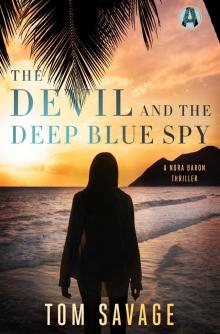 The Devil and the Deep Blue Spy
The Devil and the Deep Blue Spy Scavenger
Scavenger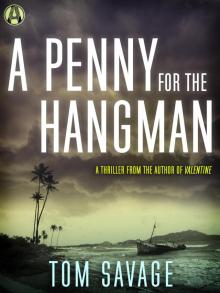 A Penny for the Hangman
A Penny for the Hangman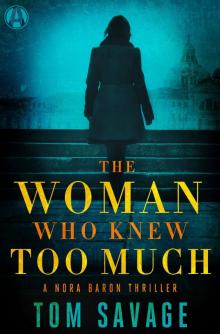 The Woman Who Knew Too Much
The Woman Who Knew Too Much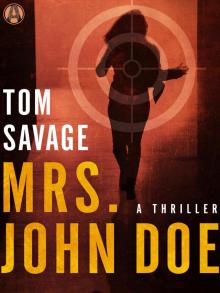 Mrs. John Doe
Mrs. John Doe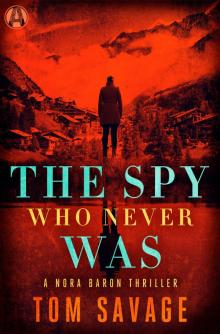 The Spy Who Never Was
The Spy Who Never Was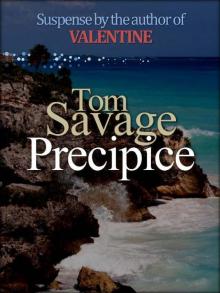 Precipice
Precipice